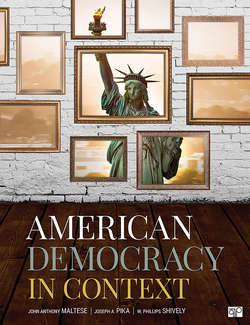Читать книгу American Democracy in Context - Joseph A. Pika - Страница 159
На сайте Литреса книга снята с продажи.
Balancing National Security with Civil Liberties
ОглавлениеDo the needs of national security justify restrictions on civil liberties? President Trump revived the debate when, in January 2017, he signed an executive order banning foreign nationals from seven predominantly Muslim countries from entering the United States. His stated purpose was to protect national security by keeping terrorists out of the United States. But given Trump’s pledge during the 2016 presidential campaign for “a total and complete shutdown of Muslims entering the United States,” some challenged the ban as a violation of religious liberty. Others challenged the ban on due process or equal protection grounds or as a violation of statutory guidelines. Although several lower courts overturned the ban, the Supreme Court ultimately upheld a revised version of the ban by a 5–4 vote in June 2018.132
Several Trump administration policies related to immigration (which the president formally declared to be a national emergency in order to build a wall along the southern border of the United States) also raise civil liberties issues. The highest profile of these was perhaps the administration’s family separation policy, which separated undocumented immigrants from their children as part of a zero-tolerance approach to deter migrants from entering the country. In yet another victory for the Trump administration, the Supreme Court voted 5–4 in March 2019 to uphold the government’s authority to detain any immigrant awaiting deportation who had ever been convicted of a criminal offense—even if the conviction occurred long ago and the individual had completed their prison term for the conviction. In a strongly worded dissent, Justice Stephen Breyer argued that the ruling—which allowed individuals who had already paid their debt to society to “be deprived of their liberty for months or years without the possibility of bail”—raised serious due process concerns.133
Achieving a balance between national security and civil liberties was also hotly debated in the aftermath of the September 11, 2001, terrorist attacks on the World Trade Center and the Pentagon. As part of the “War on Terror,” both Congress and President Bush took actions to limit civil liberties. Congress passed the USA Patriot Act in October 2001 to expand the government’s power to collect phone records, monitor e-mail communications, and gather information from libraries and bookstores about what people were reading. It also contained “sneak and peek” provisions that allowed the government to seize information without informing the person involved. The government argued that such measures were necessary to combat the threat of terrorism and protect national security. In 2015, the USA Patriot Act was replaced by the USA Freedom Act, which still authorized government surveillance but with greater limits.134
Behind the scenes, President Bush secretly authorized the use of warrantless wiretaps by the National Security Agency on telephone calls between the United States and foreign countries in cases where one of the parties was suspected of links to al-Qaeda. When The New York Times revealed the program in 2005, critics charged that the Bush administration had ignored civil liberties and violated the 1978 Federal Intelligence and Surveillance Act (FISA), which allowed such wiretaps only if a special court issued a warrant for the tap either before or up to 72 hours after the start of the surveillance.135 Although President Bush suspended the particular program uncovered by The New York Times, Congress validated his authority to wiretap foreign intelligence targets without a warrant, even if they were speaking to U.S. citizens, through amendments to FISA in 2007 and 2008.
Critics also raised concerns about the Bush administration’s treatment of suspected terrorists. The administration claimed the right to detain terror suspects, including U.S. citizens, indefinitely without charge and without access to a lawyer. Several Supreme Court decisions limited the powers claimed by the Bush administration. For example, Hamdi v. Rumsfeld (2004) held that U.S. citizens, including terror suspects, have the constitutional right to consult a lawyer and to contest their detention before an independent tribunal.136
The Bush administration wanted any trials of these detainees to take place before a military commission rather than in federal court, and the president authorized the use of such military commissions by executive order. However, a 5–3 majority of the Supreme Court held in Hamdan v. Rumsfeld (2006) that military commissions were not authorized by Congress and violated international law.137 The ruling was seen as a major setback for the Bush administration, but the Republican-controlled Congress subsequently passed the Military Commissions Act of 2006 at the urging of the White House. The Act authorized the use of military commissions. The Obama administration initially banned the use of military tribunals to try terror suspects but rescinded that ban in 2011.
Civil libertarians also expressed concern about the use of “enhanced interrogation techniques” (such as waterboarding) used against terror suspects by the Bush administration. The Bush administration denied that such techniques constituted torture and pointed to the broad prerogative powers claimed by presidents during war and other emergencies as a justification for such action, but critics disagreed. President Obama eventually revoked the executive order issued by Bush that had authorized enhanced interrogation.138 Although Trump repeatedly endorsed such techniques during the 2016 presidential campaign (saying at one point that he would endorse the use of waterboarding “in a heartbeat” because “only a stupid person would say it doesn’t work”), his Central Intelligence Agency director, Gina Haspel, promised during confirmation hearings not to resume the use of enhanced interrogation techniques.139
